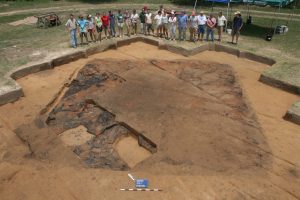The Spanish were the first Europeans not only to reach the Americas but to explore and settle the land that became North Carolina. Hernando de Soto’s expedition in 1539–1542 took him through the Appalachians. Twenty-five years later, Juan Pardo established a fort in the Piedmont that he hoped would be the first outpost of a Spanish empire in North America. Spain’s efforts to conquer the east coast failed, but for centuries they ruled Central and South America as well as what is now the southwestern United States, and their presence in Florida shaped English plans for colonization.
In this chapter we’ll look at the first European explorations and colonies in the New World, beginning with Columbus and continuing with De Soto and Pardo. We’ll weigh their interactions with, and impact on, native populations. We’ll also consider the process of exploration itself — how early explorers and mapmakers figured out where they were and told others about their discoveries.
